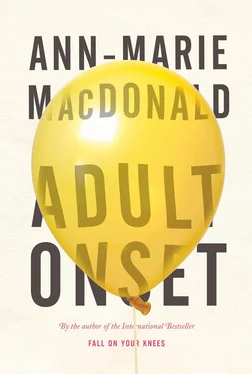“You hear that?” he whispers. “That’s the cuckoo bird.”
•
Mary Rose remembers her first home in the white stucco apartment building that sparkled in the sunlight. She can see now the living room with its gleaming coffee table, and the glass door that opened onto the balcony and the beckoning blue yonder — like going from a black-and-white photo into “living colour.” The balcony was a magical place, both daring and safe. They lived on the third floor but it seems in memory a majestic height. In warm weather she played out there with Maureen, who would set up two buckets of water so Mary Rose could swim from the Atlantic to the Specific — or perhaps she only thinks she remembers because Maureen regularly told her about it — more “lore.” Just as she thinks she remembers being held by her father at sunset, encircled by his warmth, looking onto the vastness of the trees and sky. The balcony was where her father first gave her the world.
They were not allowed to play out there by themselves, especially if there were buckets that could be overturned and used to scale the railing. It is normal for a mother to be vigilant, and Maureen recalls being punished for leaving the buckets out there, but it does not surprise Mary Rose that their mother was especially anxious, having already lost one baby. Or was it two at that point? When exactly was Alexander born? By the time Mary Rose was big enough to swim the world’s oceans on a balcony she would have been around two. In any event, there was definitely one occasion on which she and her sister Maureen found themselves on the balcony together all alone.
“The time you hung me over.”
“Mary Rose, you must have dreamt that!”
•
He hires a German woman to look after the baby during the day while he is at work and his older girl is at school, but every night, he rises at the first cry. He fumbles with bottles and pricks himself on diapers pins. He walks the floor, the little wailing face damp at his neck. Though his Basic Military Training has given him stamina, nothing in his upbringing has prepared him for the heart-gaping loneliness of a baby in the night — or the depth of comfort in his power to console her. He rocks her against his chest, her toothless gums suckle his bare shoulder.
“There, there, it’s all right, now. Daddy’s got you.”
•
The grounds around the apartment buildings where the military “dependants” lived were immaculately tended, lindens had been planted and mulched, sidewalks led to the operational side of the base where her father worked and the jets took off. But a stone’s throw from their building, just beyond the new wading pool and the old bunker, was the Black Forest. It was not a wilderness in the North American sense, laced as it was with pathways that locals and military families alike set out on for weekend Wanderungen , but it was dense. The trees, mainly conifers, grew close together, blocking the sun, hence its name; shade rendered the floor springy with moss, mysterious with mushrooms, and lively with streams that trilled down from the Alps, the whole effect both enchanting and forbidding. If you strayed from the paths and ventured deep enough, you might be charged by a wild boar or lured by a talking wolf. Maureen told her that at Christmastime elves decorated the trees at the heart of the forest but no one except Santa Claus had ever seen them.
•
His wife is released from hospital a month or so later and Duncan lets the German woman go. Dolly has put her foot down: there is no longer any need for help during the day. “I’m the mother.” Nor, she makes clear, is there any need for him to walk the floor in the night.
•
Dolly’s unabashed love of getting to know people and places, her fearless brand of absurd Kanadische Deutsch , endeared her to the local Frauen, who looked as though they hadn’t smiled since before the war. She dressed little Maureen immaculately, pulling tight her braids, meeting with approval wherever she went—“Aber schön!” Maureen flanked her as she pushed the pram with the baby in it — the second Mary Rose.
There were parties at the Officers’ Mess, glittering affairs with dance bands and smorgasbords — a far cry from perogies and the occasional standing roast in Gimli. Mary Rose cherishes the recollection of her mother in an evening gown, posed next to her father in his formal mess kit — what he called his “monkey suit.” Or perhaps she cherishes the stories.
Dolly got herself elected head of the Wives Club: a well-oiled machine whose pecking order mirrored the husbands’ ranks, it was not without its political hazards. She unseated the CO’s wife, Eileen Davies — who put a brave face on things with the offer to spearhead a commemorative recipe book — and found herself at the nerve centre of a domestic, festive whirl, from parties and welcome wagons to school concerts, bazaars and making sure every mother who needed a hand got one. Dark little Dolly from Sydney, Cape Breton, discovered she could run things. Her husband wasn’t surprised. “Why d’you think I married you? It wasn’t just for your looks, Doll Face.” She laughed at him, because he really did think she was pretty. When she was fine, she was very very fine.
•
But she is still tired. The more so, now that she is up in the night with the baby. When it naps in the day, so does she, on the couch in the living room facing the coffee table. Beyond it is the glass door to the balcony. Above the railing is sky, below it, bars. Are they close enough together to be safe for a baby? She gets up to check.
Outside, the trees that shaded the grounds in summer are bare and look to be cowering. But the evergreens that hem the base appear to have drawn closer. She smells snow. She returns to the couch and lies back down. She hears the baby crying. She has never lived in an apartment before, high above the ground with a million-dollar view. She never dreamed she would be living in Europe, married to the nicest man in the world. She always knew she would have babies, but thought she would be more like her own mother when the time came. She is not crying, her eyes are leaking. Her breasts are leaking too, but that will stop on its own — her milk is no good. Nowadays formula is better anyway.
She hears a baby crying. What day is it? It must be a weekday, her older girl is at school, her husband at work. She gets up and goes in. The baby cries whether she picks it up or not. Whether she feeds it, changes it, rocks it, bounces, shakes — the baby looks at her as though it knows something about her.
“Mary Rose,” she says. And her voice sounds flat in her ears. As though she is telling a lie.
The cuckoo clock strikes the quarter hour.
•
During the day, Duncan “flew a desk” just as he had back in Canada, but no longer mourned his lost chance at aircrew — with his blue eyes and boxer’s reflexes he had been a shoo-in. He was disqualified when the Wing Commander saw that, in the box next to Marital Status, he had ticked “married.” In those days, the jets were “widow makers” and the military, fresh from the Second World War, had enough of those on their hands. But the view from behind a desk was more interesting over here in Europe, to say the least. He was at the “sharp end,” and not just of a pencil but of the Cold War. The Soviet Union was a thirty-second muster away. “Logistics” took on a whole new meaning in this context, and every day at sunset when he held his little one on the balcony, he understood the meaning of Peace. And that he had a role in it.
•
Is she letting it cry too long? Babies need to cry in order to strengthen their lungs.
The daylight on the balcony stays the same for a long time. She would like to go out there in the sun … But she feels too heavy.
Читать дальше












